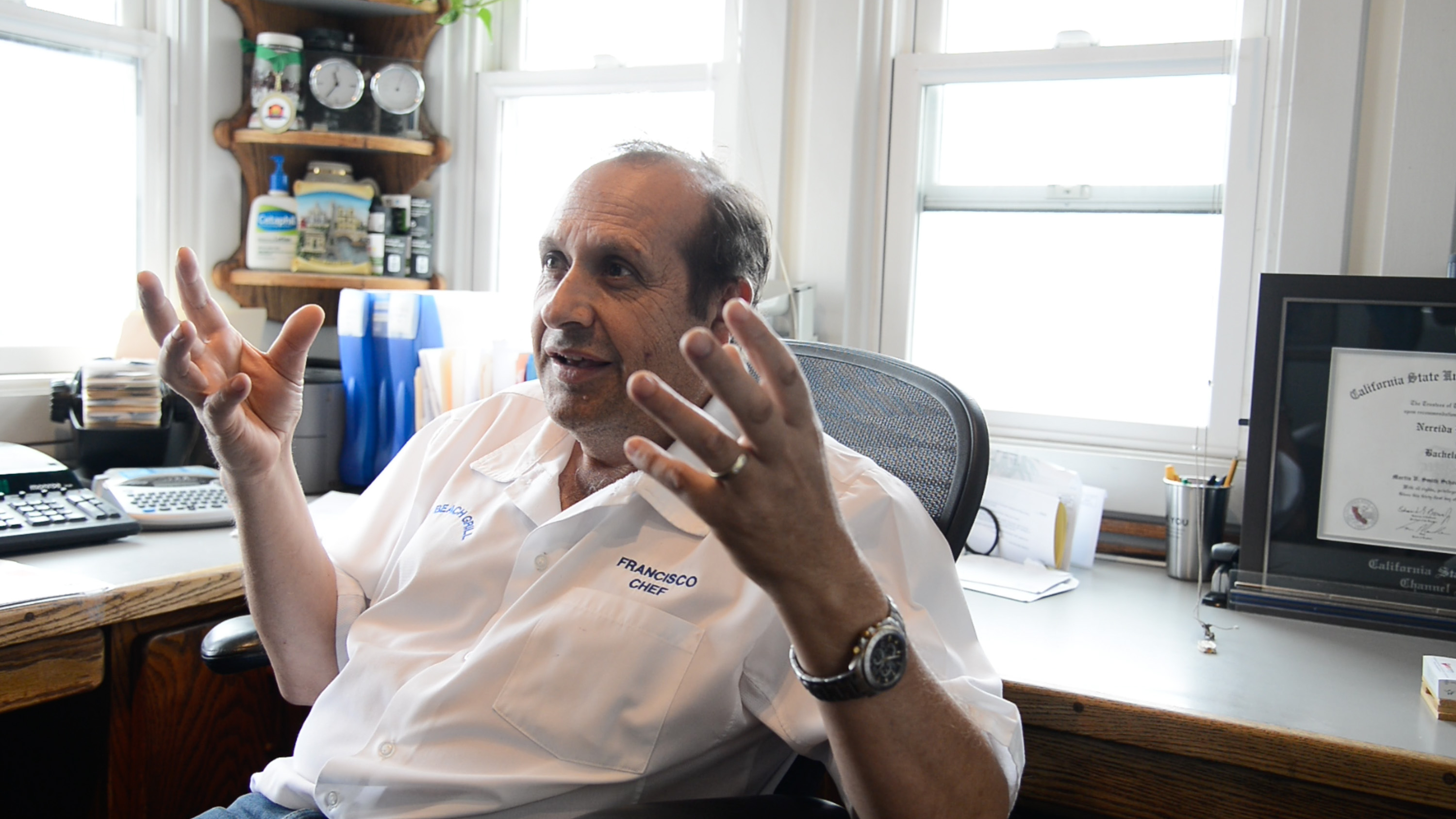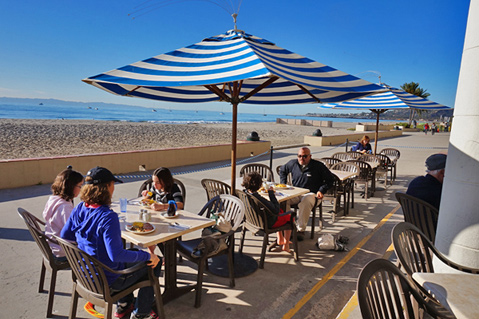Goodbye, East Beach Grill
After 33 Years, Owner Francisco Aguilera Is Leaving with a Twisted Arm and a Broken Heart

Francisco Aguilera was 14 years old when he set off from Durango, Mexico, eventually ending up in Santa Barbara, where he took a job as a dishwasher at the East Beach Grill.
For the next 33 years, Aguilera worked at the seaside restaurant on the first floor of the Cabrillo Pavilion Bathhouse, graduating to cook and manager, and finally to owner and leaseholder. He still arrives every morning at the crack of dawn to open the doors by 6 a.m. He has never missed a day. Over the decades he has gotten to know his regular customers and their kids who’d skip straight from the ocean to his counter, asking for ice cream. Now grown, those kids bring their own children and grandchildren to the restaurant, one of the last places in Santa Barbara with $5 hamburgers and a bathing-suit-welcome dress code.
Last Thursday, sitting in his tiny office perched above the Great Pacific Ice Cream Company that he owns next to Char West, which he also owns, Aguilera looked out toward the East Beach Grill a mile down the coast. “It breaks my heart,” he said. In December his lease ends, and the city will close the public bathhouse building for a massive $15 million renovation of its upstairs event space, offices, gym, and restaurant. Aguilera had hoped to reopen his grill when the work was completed, but lease negotiations with the city failed. “I did my best,” he said, throwing up his hands. “But I’m out.”
Last September, the Santa Barbara City Council voted to give Aguilera first crack at resecuring a lease before the concession was opened to public proposals. The decision was made against the recommendation of Parks and Recreation Department Director Jill Zachary, who argued simultaneous bids would give the city the best deal. Whoever operated the bathhouse’s restaurant would be required to open for dinner, provide a full bar, and generate much-needed revenue for her department, which had been recently forced to cut public youth and sports programs. A City Council chamber jam-packed with Aguilera’s customers, all lobbying to allow him to retain the lease, however, persuaded the councilmembers. “When you spend 33 years in one spot,” said Aguilera, “you make a lot of friends.”
In his proposal, Aguilera outlined a plan to transform the East Beach Grill from a casual breakfast and lunch joint into an upscale restaurant. He would rebuild his dining room and kitchen at a cost of $1.5 million and then wait the two years of construction before the building could reopen. The lease was the sticking point. Aguilera said the city wants a guaranteed $400,000, more than twice what he pays now. He believes it would be impossible for anyone to afford that, even with the more upscale offerings. “It’s just bad business,” he said.

Since 2008, when Aguilera bought the East Beach Grill from his mentor and boss John Williams, he’s doubled his profits by increasing them a few percentage points every year. The same goes for Char West and the ice cream parlor. “Slow and steady” he learned from Williams, who also advised him to save his extra cash, so now he is completely debt free. Financially, said Aguilera, he’ll be fine without the grill. It’s the way he’s losing it that upsets him.
His dealings with Zachary have felt especially ungracious, Aguilera said, pointing to her short, final email stating his proposal had been rejected. Their personal interactions — or lack thereof — stand in stark contrast to the good working relations he currently enjoys with the city’s waterfront department. Aguilera empathizes with the city. “They have bills and employees to pay,” he said. “But,” he went on, “I feel like I’m getting kicked out after so many years of working hard and paying rent. My life is in that place.” Worse, Aguilera worries about his 24 employees, who currently have 401(k) plans and a profit share of the company but will soon be out of a job.
For her part, Zachary said the city wants to return the bathhouse — originally built in 1926 by millionaire philanthropist David Gray of Ford Motor fame — to its former glory while at the same time “providing a restaurant that’s enjoyed by everyone.” Though she denies the city wants to replace the grill with a “high-end” business, the city did give prospective operators a packet of interior photographs suggesting what the renovated restaurant might look like — the photos were all of hip, high-class, high-ceiling eateries, such as the Santa Barbara Public Market.
Operating a building the size of the bathhouse with all its programs and services isn’t cheap, Zachary explained. Her department was hit hard during the recession, from which it is still trying to recover. Revenue from the building’s restaurant, event spaces, and other profit-making ventures must pay the overhead, or the money is taken from the city’s General Fund. “I’d rather subsidize something else,” said Zachary, such as free city programs for low-income families. “We’d like the building to be self-sustaining,” she said.
Currently, the bathhouse costs $740,000 a year to run. Revenue is approximately $770,000 a year, with the restaurant providing around 20 percent of that. The city hopes to increase overall revenue by 30 percent with the upgrade, which will create new multipurpose rooms, make better use of dead space, add modern technology, and extend operating hours. Right now, many of the amenities are decidedly shabby without the chic. “The 90 years are taking their toll,” said Zachary. “We have no funds to reinvest in the infrastructure, and the building is falling apart.”
As for determining the future of the restaurant, “It has not been easy for anyone involved,” said Zachary. The city has been up-front with Aguilera from the start, she said, and took pains to publicly acknowledge their good working relations. That longstanding positive dynamic made deliberations especially tough. “I thought it best to separate the business part of the negotiations from our day-to-day operations because we did not know whether we would develop a mutually beneficial agreement,” said Zachary, who admitted she could understand his feelings about the email. The direction she was given by the City Council after it turned Aguilera down was “to be straightforward.”
Aguilera’s legion of friends and customers will be sad to see him go. Filmmaker John Klein is one of them. He’s frequented the grill for almost 40 years. “Where else in this town do cultures and generations and economic classes mix so easily, so happily?” he asked. Klein called the city’s willingness to lose Aguilera as symptomatic of a waning diversity. “There are certain things, certain people that keep this city together,” he said. “Francisco is one of them.”
Before Aguilera leaves the grill in December, he asked customers to swing by for one last stack of blueberry pancakes. In the meantime, he will continue his daily routine of opening the restaurant in the morning. “I’m not going to look back,” said Aguilera. “I’m going to look forward and move on.”



